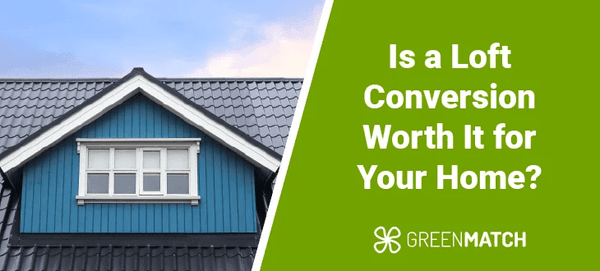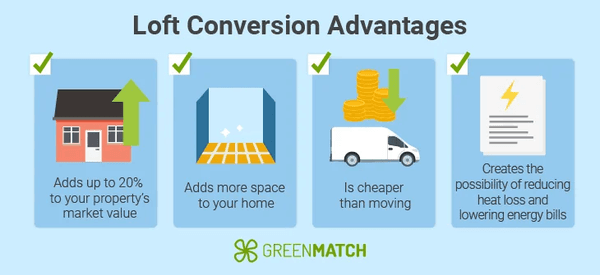Answer these simple questions and we will find you the BEST prices
Which type of solar quotes do you need?
It only takes 30 seconds
100% free with no obligation

Get Free quotes from loft conversion specialists near you

Save money by comparing quotes and choosing the most competitive offer

The service is 100% free and with no obligation
- GreenMatch
- Loft Conversion
- Advice & Tips
- Is It Worth It
Is a Loft Conversion Worth It for Your Home? (2025)


- A loft conversion can increase your property’s value by up to 20%,
- Loft conversion adds functional living space and usually improves energy efficiency.
- A loft conversion is often less expensive than moving, considering the costs of estate agent fees, stamp duty, and moving services.
When you’re thinking about a loft conversion, the big question on your mind is likely: "Is it really worth it for my home?"
You want practical answers, not just about the cost, but whether it will genuinely add value to your property and improve your living space. Will it be a better option than moving? Can you expect a solid return on your investment?
This guide is here to give you those clear, straightforward answers, helping you weigh the financial benefits and real-world advantages of a loft conversion for your unique situation.
Comparing loft conversion installers can take hours and be very stressful when done alone. Fortunately, we can connect you with up to 3 approved installers near you for free!
Just fill in our 30-second form and we’ll do the rest.
Click below to begin!
- Describe your needs
- Get free quotes
- Choose the best offer
It only takes 30 seconds



Is a loft conversion worth it?
Converting a loft can be a smart investment for various reasons. Here are the key benefits:
- Increased property value: A loft conversion can add up to 20% to your home’s value, making it a cost-effective way to expand space and attract buyers.
- High return on investment: Compared to other home improvements like extensions, loft conversions provide one of the highest returns on investment.
- Maximising unused space: Converting your loft turns underused space into functional rooms, adding practicality without the need for costly extensions.
- Avoiding the cost of moving: Instead of paying for a move, a loft conversion gives you more space in your current home, avoiding expenses like stamp duty.
- Improved energy efficiency: Loft conversions often include better insulation, which reduces heat loss, lowers energy bills, and boosts eco-friendliness.
- Flexible living space: A loft conversion offers adaptable space that can serve as a bedroom, office, or playroom, enhancing your home’s versatility.
- Planning permission is not always required: Many loft conversions don’t need planning permission, making them a quicker and simpler way to add space.
Adding high-quality insulation during the conversion helps keep heat inside, reducing energy use and lowering your heating bills. It also makes your home more eco-friendly by cutting down on wasted energy. You can also add energy-efficient windows or even solar panels to boost sustainability further.
Common concerns about loft conversions
A loft conversion can be a fantastic way to add value and space to your home, but it’s natural to have concerns before starting the project.
Here are some common worries homeowners face and loft conversion tips to help you feel more confident about your decision:
- Financial concerns
This type of project can be expensive, with attic conversion cost in the UK ranging anywhere from £20,000 to £60,000, depending on the type of conversion. Some worry about unexpected expenses pushing their budget even further.
Solution: Set a clear budget from the start and include a 10–15% contingency for unforeseen costs. Get multiple quotes for loft conversion to ensure competitive pricing and realistic estimates.

- Structural stability
Homeowners may worry whether their existing structure can support the additional weight of a loft conversion, windows and furniture.
Solution: A structural engineer can assess your home’s stability. Reinforcements, like additional joists or steel beams, can be added to strengthen the structure, ensuring it meets building regulations and supports the additional weight.
- Headroom limitations
Often lofts in UK homes have limited height, making the space feel cramped or even unusable. You may be wondering if your loft is suitable for a conversion.
Solution: Ensure the minimum head height is at least 2.2m. If not, consider options like lowering the ceiling below, raising the roof or adding dormers - though these may add to the cost.

- Planning permission
Not all loft conversions fall under permitted development, and homeowners may worry about planning permission delays.
Solution: Consult with your local planning authority or a professional early in the process. Many loft conversions can proceed without full planning permission, but understanding your specific situation is crucial.
To fully understand whether your loft conversion requires planning permission, it's essential to get expert advice. Contact local loft conversion specialists who can assess your specific project and guide you through the process.
They’ll help determine if your plans fall under permitted development or if you’ll need to apply for full planning permission, ensuring you comply with all regulations before starting work.
There are two ways to compare loft conversion installers in your area: spend hours of your time searching on your own, or fill out our quick 30-second form, and we’ll handle the hard work for you.
We’ll connect you with up to 3 trusted installers in your area. Click below to get started.
- Describe your needs
- Get free quotes
- Choose the best offer
It only takes 30 seconds



- Disruption during construction
The building process can be disruptive, leading to noise, dust, and restricted access.
Solution: Plan for the disruption by scheduling the project during a time when you can manage the inconvenience. Good contractors can minimise disruption by keeping the work confined to the loft as much as possible.
- Impact on neighbouring properties
Some homeowners worry about how a loft conversion will affect their neighbours, especially in terms of privacy and shared walls.
Solution: Discuss the project with your neighbours early and address any concerns they may have. For shared walls, a party wall agreement may be required, and ensuring proper soundproofing will help maintain privacy.
Takeaway: Is it worth doing a loft conversion?

A loft conversion is often worth the investment. First of all, it’s based on how much value a loft conversion adds. It can add up to 20% to your property’s market value, making it a cost-effective way to gain more living space without moving.
The additional room can serve as a bedroom, office, or bathroom, increasing the functionality and appeal of your home, especially in competitive housing markets.
Financially, a loft conversion is often less expensive than moving, considering the costs of estate agent fees, stamp duty, and moving services. You can tailor the space to your needs while staying in your current home, avoiding the stress of relocation.
Additionally, when constructing a loft conversion, you can install high-quality insulation. This will reduce heat loss and lower energy bills. Insulation also helps reduce condensation in loft conversion—a common issue in loft spaces—by maintaining proper airflow and moisture control. For more information on this, visit our condensation advice page.
To sum up, a loft conversion not only adds value but also improves your home’s energy efficiency and comfort, making it a practical and financially sound investment.
Want to get loft conversion but don’t know where to start?
We can find you up to 3 free quotes from loft conversion installers in your area.
Avoid the hassle of spending days on research and comparisons on your own. Fill in our 30-second form, and we’ll do the rest.
Click below to begin!
- Describe your needs
- Get free quotes
- Choose the best offer
It only takes 30 seconds



FAQ
Potential issues include high costs, limited headroom, disruption during construction, and the need for structural reinforcements. Planning permission may also be required, depending on the project.
Yes, a loft conversion can increase your property’s value by up to 20%, add functional living space, and improve energy efficiency, making it a smart long-term investment.

Tania is an experienced writer who is passionate about addressing environmental issues through her work. Her writing aims to shed light on critical environmental challenges and advocate for sustainable solutions.
We strive to connect our customers with the right product and supplier. Would you like to be part of GreenMatch?

